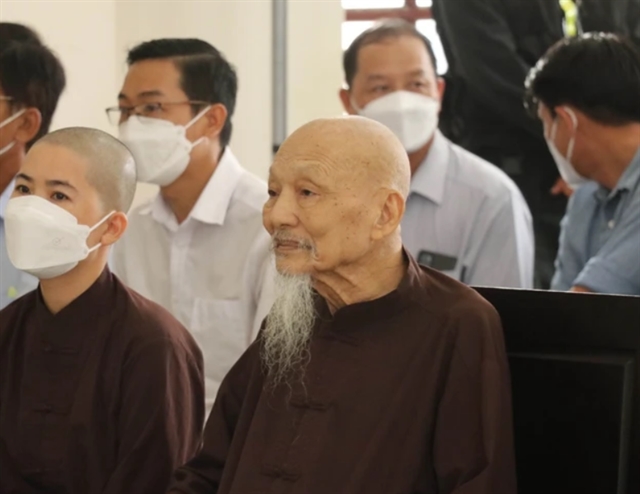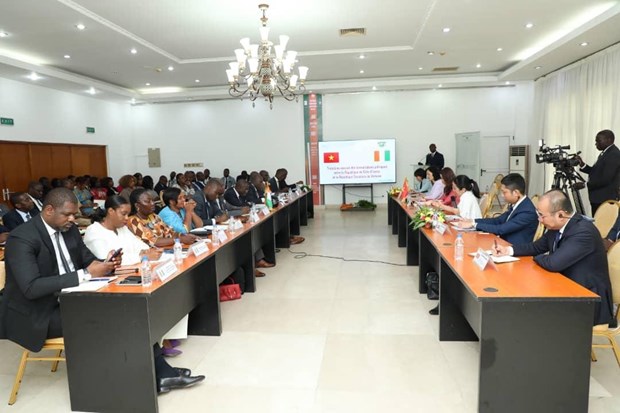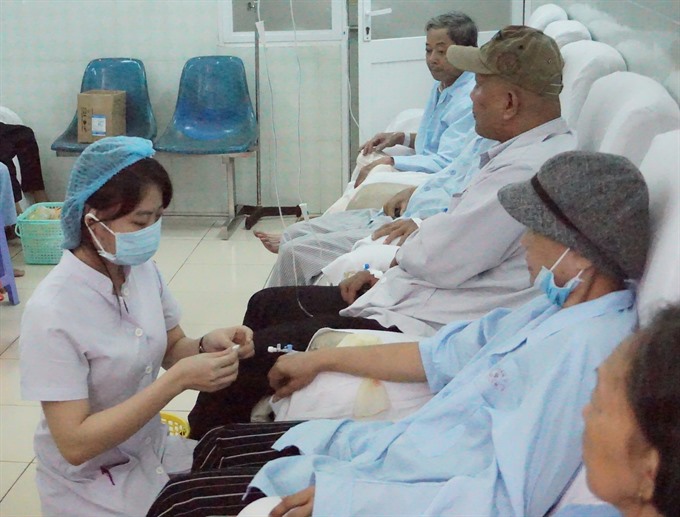 Society
Society

Phạm Đức Văn, 69, of HCM City’s Tân Phú District was completely unaware that he had colorectal cancer until he saw blood in his stool.
 |
| Cancer patients receive chemotherapy at the 175 Military Hospital. — Photo San Hà |
San Hà
Doctors lament lack of cancer-screening awareness in VN
HCM CITY — Phạm Đức Văn, 69, of HCM City’s Tân Phú District was completely unaware that he had colorectal cancer until he saw blood in his stool. Even then, he preferred to take traditional medicines and go on a diet for several months rather than going to get examined.
The symptoms became more and more severe and he agreed to go for medical examination and treatment, his wife Nguyễn Thị Vang said. “My family was shocked by the diagnosis since we never thought it could be cancer,” she said.
Now he is undergoing chemotherapy at 175 Military Hospital following a surgery in April.
Phạm Thành Luân, an oncologist at the hospital, said most cancer patients come to the hospital in advanced stages of the disease, like Văn, when chances of survival are much lower and treatement much more expensive.
If diagnosed early, colorectal cancer can be treated with minimally invasive surgery, with a survival rate of more than 90 per cent, he said.
The reasons for the late diagnosis are often lack of awareness of the need for regular health checks and screenings or lack of money to travel to a hospital and take the tests, he said. In many cases, the delay is also due to cancer patients seeking traditional treatment first, he added.
Vang, too, does not get regular check-ups or cancer screening. “Why do I have to take cancer screening tests since I feel very good?” she asked.
Early detection
According to oncologists, screening and early detection are shown to be effective in curing cancr or at least improving survival rates.
In HCM City, more than 5,000 new cases are detected every year, 3,500 of them at advanced stages, according to the HCM City Oncology Hospital.
Phạm Thị Bích Vân, head of the hospital’s screening and examination department, said her department gets around 1,500 patients a month, with 90 per cent showing cancer symptoms. By the time symptoms appear, the cancer could have begun to spread and the chances of a cure are low, she said.
“The number of new cancer cases is on the rise in all age groups and among both sexes, while the rate of screening for early detection remains modest. Only 10 per cent of the patients come for cancer screening tests for the purpose of early detection," she said.
The leading types of cancer are of the breast, cervix, stomach and lungs for women, and lungs, stomach, liver, and colon-rectum for men, she added.
Trần Đặng Ngọc Linh, head of the oncology department at the University of Medicine and Pharmacy, said breast cancer is the most common among women in Việt Nam and its incidence has been rising in recent years. More than 11,000 new cases are reported every year and around 4,500 women die every year, she said.
Women aged 40-45 should start getting mammographies annually, which is the best way to detect breast cancer early, she said.
Lê Thị Kiều Dung, head of obstetrics and gynecology at the HCM City University Medical Centre, said cervical cancer is the second most common among women after breast cancer. In Việt Nam, around 5,100 women are diagnosed with cervical cancer every year and 2,400 die of the disease, she said.
Cervical cancer can be cured if detected early, and the treatment cost and recurrence rate are low, she said.
Mobile examination vehicles
The World Health Organisation (WHO) placed Việt Nam 78th out of 172 countries in terms of cancer incidence.
Around 68,000 cases were diagnosed in 2000, and the number is expected to almost triple to 190,000 in 2020, it said. Every year around 115,000 people die of cancer, or 315 a day.
Shigeru Suganami, chairperson of the Association of Medical Doctors of Asia, said in Japan medical institutes and local public health offices have historically played a significant role in the early detection of cancers.
Mobile medical examination is another key factor in screening for and detecting cancer, he said.
Companies owning mobile examination vehicles call on people at their offices to screen for abnormalities such as tuberculosis, pulmonary cancer and gastric cancer by conducting physical check-ups, he said. Comprehensive health screening is also offered in the vehicles, he said.
Health agencies and hospitals should carry out regular campaigns to increase public awareness of cancer screening, and health insurance should cover part of the cost of regular health checks and screening.
Mobile medical examination is an effective and time-saving method to screen people while they are at work, he added. —VNS









